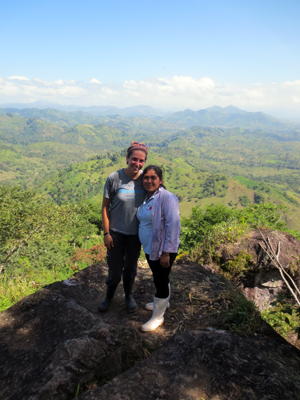Sustainable Engineering Program Takes Alumna from Villanova to Nicaragua to Harvard

Musso with her guide to the water systems in Nicaragua
As Mechanical Engineering major Julia Musso prepared to graduate from Villanova University in the spring of 2011, she knew exactly what she wanted to do with her life: Utilize her engineering skills for international development work, and try to help people less fortunate than herself. What Musso wasn’t sure of was the best way to make those goals a reality. Reflecting on her time in the College of Engineering, Musso could easily point to two Habitat for Humanity trips and a service trip to Waslala, Nicaragua as the most transformative experiences of her undergraduate career. Her work in Nicaragua focused on issues of sustainability, and in combination with her interest in international development, Musso discovered her calling.
“I had not even considered going to graduate school immediately after earning my bachelor’s degree,” says Musso. “But a friend in the MS in Sustainable Engineering (MSSE) program strongly recommended that I look into it, considering my interest in this area.” What ultimately convinced Musso that an MSSE was right for her were the conversations she had with College faculty. “I talked with Dr. Ortega, who had been on my first Waslala trip, and I spoke with Jordan Ermilio, director of the service learning program, and together we developed a proposal for a fellowship that would allow me to integrate the Waslala service experience into my graduate degree program.” That fellowship translated into a six-month stay in the region during Musso’s second year in the Sustainable Engineering program. There, she conducted her graduate research on “Assessing Sustainability of Gravity-fed Water Systems in Rural Nicaragua.”
Flexibility is one of the aspects of the program that Musso most appreciated. “My advisors were very helpful and allowed me to accomplish what I wanted to accomplish. They provided me with the opportunities I needed.” Musso also points to program director Bill Lorenz as a driving force behind her positive experience in the program. “Bill is so passionate about helping his students succeed. It really makes a difference to learn from someone like that.” In addition to flexibility, Musso recognizes the diversity of students as another wonderful aspect of the MSSE degree program. “It brought together people from all different backgrounds and perspectives who share the same passion about the environment and an efficient society, and who want to build a more sustainable world together,” she explains.
In November 2013, Musso started a new job at Harvard Business School. “The employer had never met anyone with a degree in Sustainable Engineering, and I think that’s what got their attention,” she says. Giving credence to Villanova’s belief that sustainability and engineering are two areas that align more closely than ever, Julia’s education as a technically proficient engineer, as well as a sustainability-minded professional, set her apart from the competition. At Harvard, her work focuses on improving the efficiency of the Business School’s buildings, and managing renewable energy projects. She also tries to reduce energy, water and waste from the school's facilities and operations.
Musso sums up Villanova’s graduate program in Sustainable Engineering: “The MSSE is a unique program that’s continually evolving to meet the needs of industry, as well as the needs of our planet. Other schools are starting programs like this, but Villanova University is already miles ahead.”
For more information about Villanova’s MS in Sustainable Engineering, visit VUSustainableEngineering.com.
